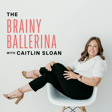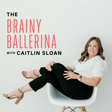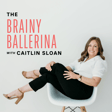
35. Cultivating Body Image Resilience with The Whole Dancer’s Jess Spinner
Jess Spinner is a former professional dancer turned multi-certified holistic health, nutrition, and lifestyle coach for dancers. She founded The Whole Dancer in 2015 to help dancers prioritize their well-being, find peace with their bodies, feel confident in their food choices, and put their health first.
One of the many things I love about Jess is how open she is with her story dealing with body image struggles and how this colored her entire experience as a dancer. In this episode, Jess is incredibly relatable with her own past as well as providing actionable tips for dancers dealing with body image issues. I truly admire the caring, but fierce mama bear approach she takes in her work as a coach. If you’ve ever struggled with your body image, this episode is a must-listen!
Key Moments:
- Jess’s early dance training [1:38]
- How Jess decided to attend college for dance and what her experience was like at Butler University [3:36]
- Her transition from student to joining Louisville Ballet to freelance dancer in Boston [9:17]
- What led Jess to found The Whole Dancer [14:48]
- Jess’s personal struggle with body image as a dancer [17:14]
- How Jess was able to heal her body image [24:07]
- The first steps a dancer should take when they are struggling with body image [27:33]
- How dancers can find body image resilience within their dance career [34:53]
- The #1 change Jess would like to see in the dance industry [38:11]
- Her biggest piece of advice for dancers pursuing a career [48:03]
Connect with Jess:
INSTAGRAM: instagram.com/thewholedancer
WEBSITE: thewholedancer.com
YOUTUBE: https://www.youtube.com/@TheWholeDancer
PODCAST: https://open.spotify.com/show/5739hERGw6QXWoRjgGu6M4?si=e29134ce3de14ece
Links and Resources:
Set up ticketing for your next event with DRT (Make sure to mention that The Brainy Ballerina sent you!)
Get your copy of The Ultimate Audition Guide
1-1 Career Mentoring: book your complimentary career call
Let’s connect!
My WEBSITE: thebrainyballerina.com
INSTAGRAM: instagram.com/thebrainyballerina
Questions/comments? Email me at caitlin@thebrainyballerina.com


